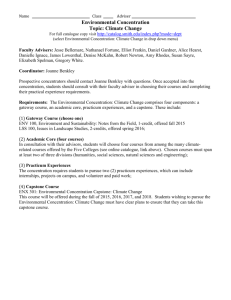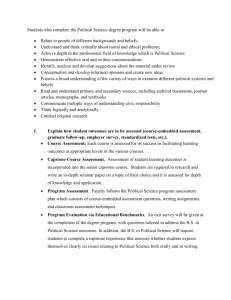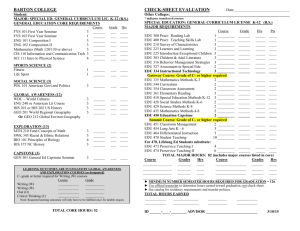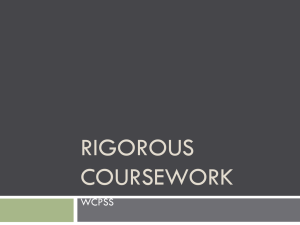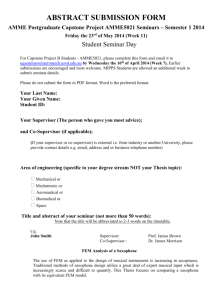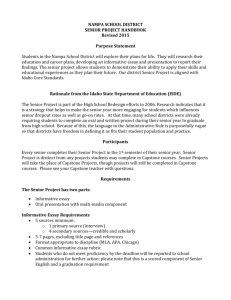Student Learning Outcomes Assessment
advertisement
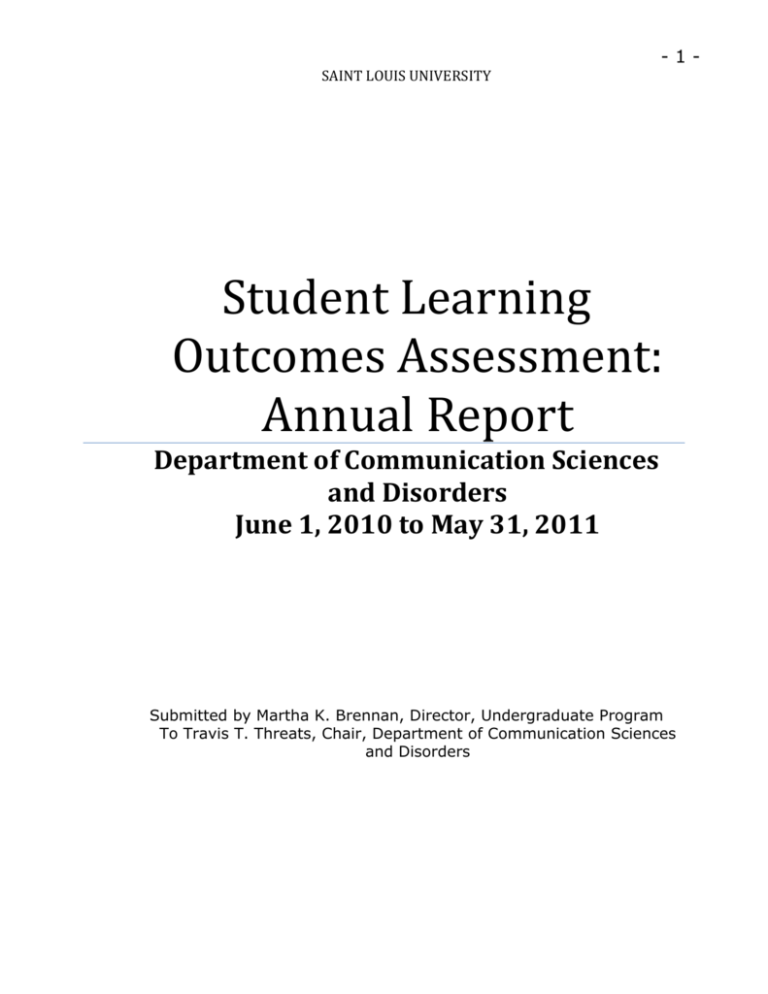
-1SAINT LOUIS UNIVERSITY Student Learning Outcomes Assessment: Annual Report Department of Communication Sciences and Disorders June 1, 2010 to May 31, 2011 Submitted by Martha K. Brennan, Director, Undergraduate Program To Travis T. Threats, Chair, Department of Communication Sciences and Disorders 2 Saint Louis University College of Arts & Sciences Student Learning Outcomes Assessment Annual Report June 1, 2010 to May 31, 2011 In the Department of Communication Sciences and Disorders, five learning outcomes are assessed annually each May for the academic year. These outcomes are derived from the five dimensions of the Mission Statement of Saint Louis University. The learning outcomes, indicators of engagement, method of assessment, and measure of achievement are listed below. This report summarizes the outcomes for all students who graduated in either December 2010 or May 2011 (20 students); of these, 18 completed a capstone project as part of Senior Seminar and 2 completed a capstone project as part of the Research Seminar/Practicum sequence instead. Department/Program Communication Sciences and Disorders Learning Outcome Assessed Learning outcome: 1.1. Students will acquire a core body of knowledge of the discipline, specifically the normal processes of human communication, common disorders of human communication, and common principles and procedures associated with clinical practice within the discipline (scholarship and knowledge). Indicator of engagement: 1.1. Students will be academically prepared for advanced study in the discipline. Description of assessment method or assessment tool Method of Assessment: Undergraduate Program Director performs transcript audits on all graduating seniors and reports aggregate data to Department Chair. Measure of Achievement: At least 80% of the seniors will be able to meet the minimum GPA requirements (3.0) for admission into a graduate school or professional degree program. Assessment Results (Summarize the overall findings) Assessment results: 85% of graduating seniors had a GPA 3.0 or better. Describe departmental action plan and priorities to address findings Goal met 3 Department/Program Communication Sciences and Disorders Learning Outcome Assessed Learning outcome: 2.1. Students will express their ideas clearly and effectively both orally and in writing in the classroom, clinic and other departmental activities. Indicators of engagement: 2.1. Students will demonstrate critical thinking and problem-solving skills essential for their level of education within the discipline, 2.2. Students will demonstrate that they can apply their knowledge to new situations, including clinical observation reports, presentations, projects, writing assignments in courses and critiques of research articles. Description of assessment method or assessment tool Method of Assessment: Capstone/research experience; statement of student performance provided by instructor of course (Department Chair) Measure of Achievement: At least 80% of the seniors will achieve a B or better in Senior Seminar or the Research Practicum. Assessment Results (Summarize the overall findings) Assessment results: 100% of graduating seniors received a B or better Describe departmental action plan and priorities to address findings Goal met Timeline for Implementation N/A 4 Department/Program Communication Sciences and Disorders Learning Outcome Assessed Learning outcome: 3.1. Students will demonstrate the ability to work effectively and collaboratively with others in social, academic, and clinical activities. Indicators of engagement: 3.1. Students will demonstrate knowledge of and appreciation for diversity within the discipline and the community. 3b. Students will demonstrate acceptance of and respect for differences. Description of assessment method or assessment tool Assessment Results (Summarize the overall findings) Method of Assessment: 3. Capstone /research experience; statement of student performance provided by instructor of course (Department Chair) Measure of Achievement: At least 80% of students will demonstrate knowledge and appreciation of diversity on the capstone/research project Assessment results: 91% of graduating seniors (Senior Seminar) achieved a B or better Describe departmental action plan and priorities to address findings Goal met; develop a rubric for Research Seminar/Practicum for evaluation of knowledge of and commitment to diversity if applicable to research project Timeline for Implementation Develop rubric for Research Seminar/Practicum by May 2012. 5 Department/Program Communication Sciences and Disorders Learning Outcome Assessed Learning outcome: 4.1 Students will demonstrate a commitment to service in the spirit of social justice, by leading through example. Indicators of engagement: 4a. Students will demonstrate commitment to social justice on capstone/research project 4b. Students are encouraged to participate in departmental, college, and community organizations. 4c. Students are encouraged to volunteer in service activities and events. 4d. Students are encouraged to join the student organization, the National Student Speech-LanguageHearing Association. Description of assessment method or assessment tool Method of Assessment: 4. Method of Achievement: capstone experience; statement of student performance provided by instructor of course (Department Chair) Measure of Achievement: At least 80% of seniors will demonstrate a commitment to social justice in their capstone experience. Assessment Results (Summarize the overall findings) Assessment results: 91% of graduating seniors (Senior Seminar) demonstrated commitment to social justice in capstone project Describe departmental action plan and priorities to address findings Goal met; develop a rubric for Research Seminar/Practicum for evaluation of commitment to social justice if applicable to research project Timeline for Implementation Develop rubric for Research Seminar/Practicum by May 2012. 6 Department/Program Communication Sciences and Disorders Learning Outcome Assessed Learning outcome: 5.1. Students will demonstrate the ability to make informed and ethical decisions pertaining to personal, social, and academic experience Indicators of engagement: 5a. Students will demonstrate the practice of values-based self-reflection in the classroom, observations, and other departmental activities. 5b. Students will demonstrate knowledge of ethical conduct as outlined by a professional code of ethics (e.g., the American Speech-Language-Hearing Association). Description of assessment method or assessment tool Method of Assessment: 5a. Capstone experience; statement of student performance provided by instructor of course (Department Chair) 5b. Class performance on questions pertaining to the ASHA Code of Ethics in Clinical Methods Measure of Achievement: a. At least 80% of the seniors will demonstrate valuesbased self-reflection on their capstone/research experience. b. At least 80% of the students will successfully respond to at least 80% of the questions concerning the ASHA Code of Ethics in the Clinical Methods course. Assessment Results (Summarize the overall findings) Assessment results: a. 91% of graduating seniors (Senior Seminar) demonstrated commitment to social justice in capstone project b. 95% scored correctly on at least 80% of the questions Describe departmental action plan and priorities to address findings Goal met; develop a rubric for Research Seminar/Practicum for evaluation of values-based self reflection if applicable to research project a. Goal met Develop rubric for Research Seminar/Practicum by May 2012. Timeline for Implementation 7 Summary: This report is compiled by the Director of the Undergraduate Program and submitted to the Department Chair each year in May for review. This year, all five outcomes were achieved according to the criteria outlined above. An action plan based on these learning outcomes is therefore not necessary at this time. Historically, most students in the department elect to complete a capstone project as part of the Senior Seminar class (offered each Spring). Students occasionally elect to do human subjects research under the mentorship of a faculty member of the department as part of the Research Seminar and Research Practicum sequence senior year. The department is currently in the process of developing a rubric as a method of assessment for Learning Outcomes 3, 4, and 5a for the research project.
